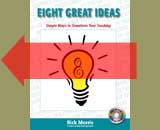

![]()
Introduction (from the book)
Eight Great Ideas is a funny book.
Not ha-ha funny, but funny because it's an odd collection of eight separate ideas explained in eight separate chapters.
Two of the eight chapters--Sentence Strips and Homework Made Easier--were already in print as 16-page teaching guides. Having written one of them in 1992 and the other one in 1997, they were both in serious need of updating. So I subjected each to a rewrite, included them in this book, and will now retire the original editions. May they rest in peace.
The other six chapters are ideas that, although significant in their own right, would not warrant a book of their own. But as opposed to letting the ideas reside in some nether world of sometimes-shared-at-seminars-but-not-available-in-print, I decided to build a book around them.
Now then, it's never my desire to upset the hall monitors of educational conformity; nonetheless, some of the ideas in this book are not based upon traditional pedagogy. They are, instead, based upon my own quest for a better way, a higher path. In order to be the best teacher I can be, I'm willing to go in a new direction, to try a new strategy, to break new ground. It's nothing more than a reflection of that whole John Cotton Dana thing in which he declared, "Anyone who dares to teach must never cease to learn."
Or, as Confucius put it:
Only through education does one come to be dissatisfied with his own knowledge, and only through teaching others does one come to realize the uncomfortable inadequacy of his knowledge. Being dissatisfied with his own knowledge, one then realizes that the trouble lies with himself, and realizing the uncomfortable inadequacy of his knowledge
one then feels stimulated to improve himself. Therefore, it is said,
"The processes of teaching and learning stimulate one another."
It's my hope that you will find the eight ideas in this book to be not only stimulating but also worthy of being used in your own classroom.
Rick Morris
San Diego, California
May 1, 2007




